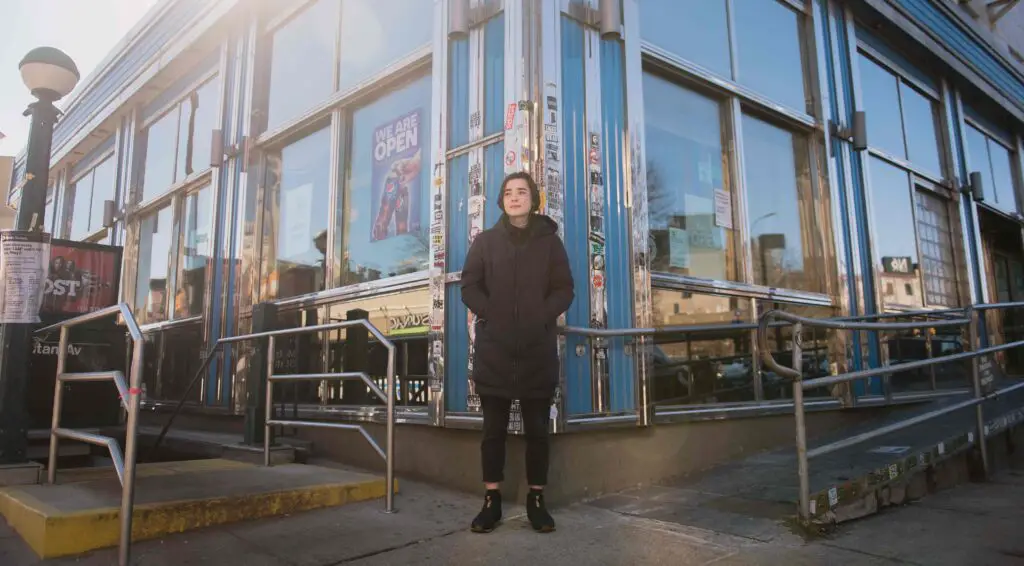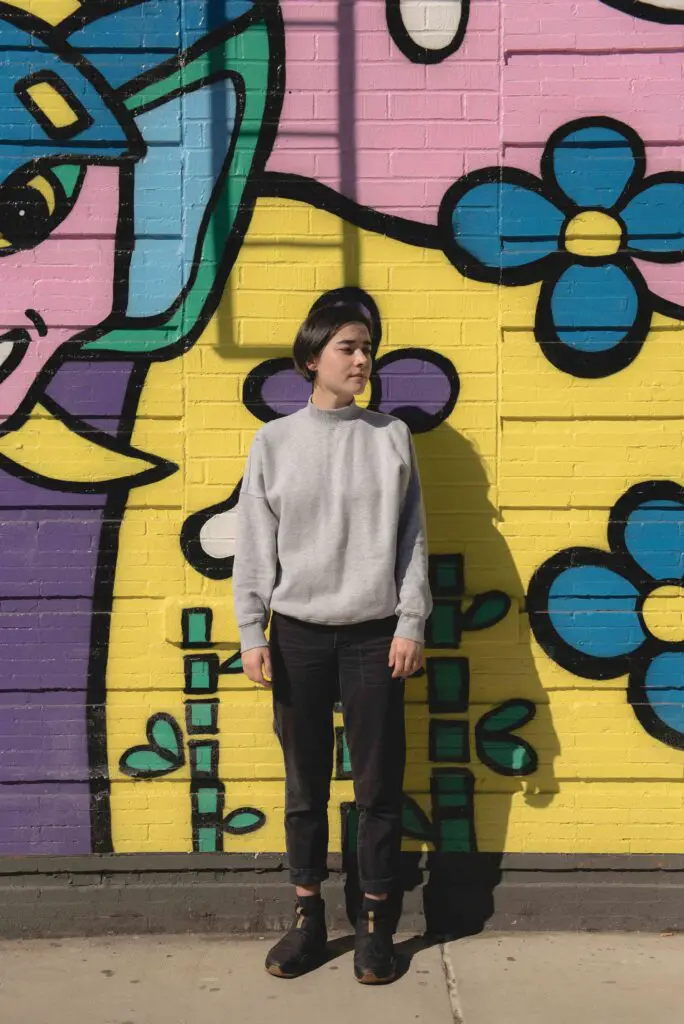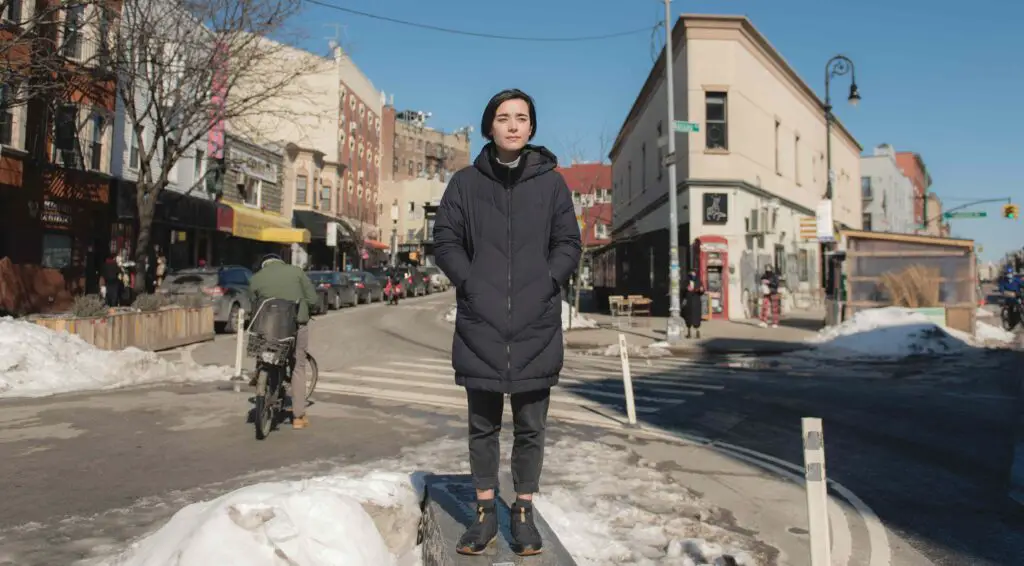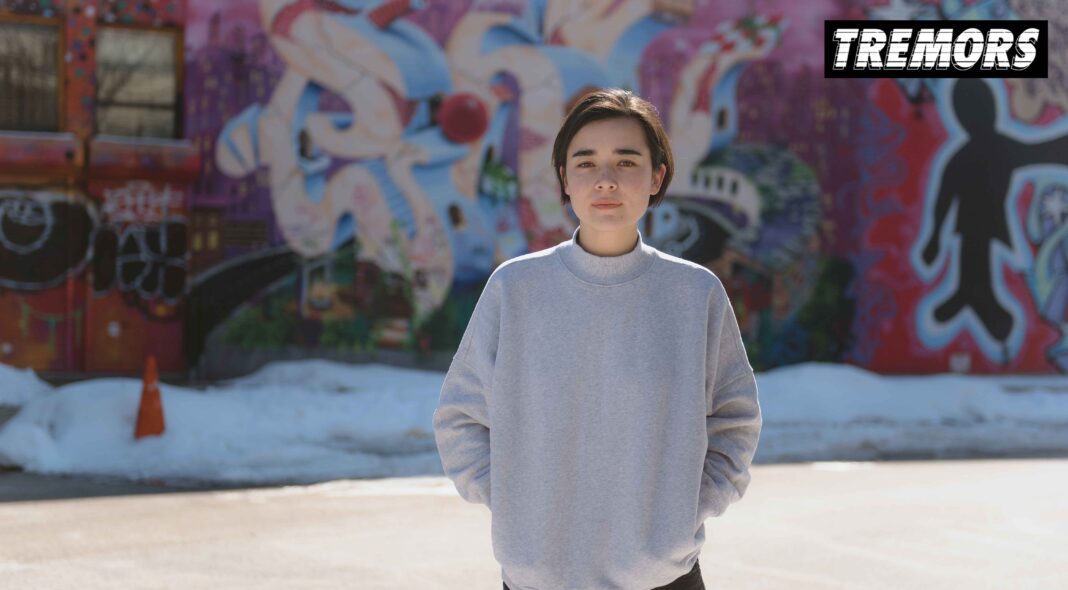Miss Grit takes her time. You can hear it in her lingering guitar solos; the sprawling outro of ‘Blonde’, the mid-point on her new EP ‘Impostor’, which warps like a well-loved film reel. This space isn’t the result of indecision, though – quite the opposite: every instrument, texture and effects pedal is meticulously chosen for a specific sonic purpose. Before ‘Impostor’, we last heard from Miss Grit, AKA Margaret Sohn, on her 2019 four-song debut EP, ‘Talk Talk’, which she hadn’t even intended to publicly release at the time: “I just wrote it to prove to myself that I could make music that I liked.” When she did release it – something she recalls as a “fuck it! moment” – the EP garnered praise and attention from all the right places for its stunning guitar work, fresh take on indie rock, and Sohn’s, well, grit.
That fitting alias of Miss Grit was a gift, an unconventional childhood nickname for Margaret that stuck, and as a musician, she was drawn to the nickname’s inherent duality: for in spite of her fearless sound, Sohn has grappled with unique and universal moments of self-doubt. It was liberating, then, to have another, self-assured persona she could slip into, to ‘Be The Cowboy’ as Mitski called for: “It’s not necessarily my alter-ego but it is a nice tool I can use to dissociate from the insecurities of my normal everyday self. To go full steam ahead with music.”

Despite her technical brilliance, gnawing self-doubt is a central theme of Miss Grit’s ‘Impostor’ EP, which takes its name from the millennial buzzword ‘imposter syndrome’: the belief that you are less competent than the perception others may have of you. These aren’t unique anxieties of our time, but we have finally discovered the language to perfectly bottle that feeling.
“It’s always been something I’ve thought about but I wasn’t able to put a label on until more recently. As I was writing the EP, I started seeing these similarities in different experiences and was able to draw lines between them. I was listening to a podcast about imposter syndrome and they said that it’s actually more common in people who are ambitious or successful. It’s not necessarily a bad trait to have – better than having zero self-doubt or false confidence – but there’s definitely a balance, I think!”

Growing up in suburban Michigan, Sohn’s parents raised her on a blend of Fiona Apple and Led Zeppelin – “having them constantly surround us with music inspired me a lot” – but this thankfully didn’t exclude her from the compulsory elementary school boyband phase. Sohn had already decided to pick up the guitar of her own accord at just six years old and had quickly fallen in love, coupled with years of comparatively less passionate cello playing: “my skill level has definitely dropped off!” she says with a laugh. A USB drive of 200 songs, a gift from her uncle in middle school, served as a gateway drug to the glory days of 2000s indie rock, helping her to discover artists like St. Vincent, The National, and LCD Soundsystem, whose influence echoes throughout her own music.
An early fascination with audio production came courtesy of her dad, an electrical engineer: ”Me and my sisters used to sing together around the house so when we were little, my dad bought us a microphone and the Cubase recording software.” This first brush with audio engineering would eventually lead her to NYU, where she studied as a music tech student and nursed a dream of making homemade guitar effects pedals rather than becoming a rock star.
As a Korean-American, this upbringing in a predominately white neighbourhood was a breeding ground for an insidious racial imposter syndrome Sohn would identify later: “It’s a subconscious thing for me now, just because it’s been my whole life. Where you feel like you want to fit into someone else’s mould or another culture and try to fight your own individuality.” The shoegaze-inspired track ‘Blonde’ specifically touches on these childhood experiences – “I wish I was blonde/ Tracking their words from all their songs, I don’t hear how I sound wrong” – until a sumptuously cathartic guitar solo rips through the anxious white noise. For Sohn, it reflects that impulse of “wanting so badly to fit in that you’d go to the extent of changing your features. I would try to pinpoint what things in me were different to other people and see how I could change the unchangeable.”

She often returns to a Mitski interview from The Daily Show with Trevor Noah because of how much it resonates: “as an Asian woman, you feel like you need to apologise when you step in the room. It’s just in your nature to wanna be invisible. And so, in that sense, I think there’s a strange juxtaposition between the music you’re ‘supposed’ to make and creating music that’s loud.”
Miss Grit certainly is loud, in the way that makes you crave live music in a sweaty, crowded venue, enveloped in scuzzy guitars and the second heartbeat of the bass pulsing through the speakers. This noise never drowns out the purposeful and controlled approach to her music either, which she writes, performs, and produces herself to prove that imposter syndrome woefully wrong at every turn: “production and songwriting go so hand-in-hand for me – I’m constantly thinking about it as I’m writing. So it’s hard for me to let someone else produce because it kind of disrupts my flow.” Though her music often bucks conventional song structure and her lyrics can be as few as four lines long, this isn’t for lack of things to say: “It’s just more comfortable to let the guitar have the spotlight rather than my voice. It makes me feel really powerful to perform live in that way.”
She’s found a musical and spiritual home in Brooklyn now, where the vast diversity means that shared experiences are far easier to come by. While the music scene might not be as obvious or tight-knit as its LA counterpart, Sohn is very fond of these “New York pockets” and finds herself gravitating to musicians in the indie folk scene particularly, such as Pearla and Kate Davis (co-writer of Sharon Van Etten’s anthemic ‘Seventeen’). In terms of the live music scene she’ll eventually return to, it’s a relatively new setting that Sohn still had a “natural instinct” to write for.

“I was playing my first couple of live shows as I was writing ‘Impostor’ and Miss Grit was my first time as the front person of a band, so I was really trying to practice that aspect. I’ve played more shows in the UK than I have in New York right now, which is very weird to think of. I guess I really haven’t played that many shows yet!” In preparation for live music’s return and in light of the Black Lives Matter movement, Sohn has already pledged to give 5% of her future live revenues to Black organisations: “Obviously it’s just a small thing because I’m still a small artist and there’s not a whole lot I can give, but in music especially, it’s really important to pay reparations to the Black community in any way possible.”
As the social anxiety anthem ‘Dark Side of the Party’ suggests, Sohn is a considerate and astute observer, whose wry wit – “flavoured water makes you smarter – no, makes you taller” – reflects an ability to cut through rose-tinted bullshit: “I miss the good parts and the bad parts of parties now. I think we’ll find that with live shows too, when they come back – there’s a certain amount of social dread everyone has but we’re forgetting that right now because we need to fantasise about it,” she observes.
She’s already working on her next collection of songs which will hopefully transform into an album further down the road. This new material has taken inspiration, in part, from movies, which isn’t the first time Sohn has referenced cinema in her music, thanks to a homage to Tarantino and Kill Bill in 2019’s ‘The Bride’. She’s a huge fan of Japanese anime and the work of Satoshi Kon, as well as Hiro Murai, who directed Childish Gambino’s ‘This Is America’ and more recently, FKA twigs’ inspired sword-dancing video for ‘sad day’. Working in tandem with directors on music videos is definitely on her bucket list: “I’m really drawn to visuals. I like to create moodboards to attach a visual aspect to my music so, with this new material, there are definitely some ideas I want to explore.”
When it comes to wider visions of the future, Sohn stays grounded: “I try not to go into the studio with a big achievement in mind. I think every artist’s goal is simply to replicate the music they hear in their head.” It’s a humble observation from a young artist already capable of forging great, complex oceans of sound; trusting you to ride along with her for every glorious minute-long instrumental which stretches and fades like a movie you’re reluctant to see end.







